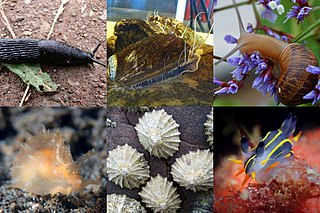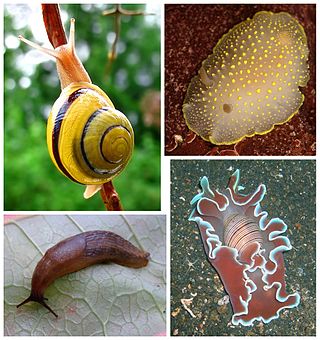
The gastropods, commonly known as snails and slugs, belong to a large taxonomic class of invertebrates within the phylum Mollusca called Gastropoda.

Sea slug is a common name for some marine invertebrates with varying levels of resemblance to terrestrial slugs. Most creatures known as sea slugs are gastropods, i.e. they are sea snails that over evolutionary time have either completely lost their shells, or have seemingly lost their shells due to having a greatly reduced or internal shell. The name "sea slug" is most often applied to nudibranchs, as well as to a paraphyletic set of other marine gastropods without obvious shells.

Heterobranchia, the heterobranchs, is a taxonomic clade of snails and slugs, which includes marine, aquatic and terrestrial gastropod mollusks.
Volutoidea is a taxonomic superfamily of predatory sea snails, marine gastropod mollusks in the clade Neogastropoda.

Sea snail is a common name for slow-moving marine gastropod molluscs, usually with visible external shells, such as whelk or abalone. They share the taxonomic class Gastropoda with slugs, which are distinguished from snails primarily by the absence of a visible shell.

Chorus giganteus is a species of sea snail in the family Muricidae. It is endemic to the coast of Chile, where it occurs from Antofagasta (23° S) to the south of the country at depths of 8–30 metres (26–98 ft). It is a benthic predator that lives on rocks in temperate waters. It has been overexploited by local fishermen in much of its range.

Freshwater snails are gastropod mollusks which live in fresh water. There are many different families. They are found throughout the world in various habitats, ranging from ephemeral pools to the largest lakes, and from small seeps and springs to major rivers. The great majority of freshwater gastropods have a shell, with very few exceptions. Some groups of snails that live in freshwater respire using gills, whereas other groups need to reach the surface to breathe air. In addition, some are amphibious and have both gills and a lung. Most feed on algae, but many are detritivores and some are filter feeders.

Eupleura is a genus of sea snails, marine gastropod mollusks in the family Muricidae, the murex snails or rock snails.

Typhis is a genus of sea snails, marine gastropod mollusks in the family Muricidae, the murex snails or rock snails.
Venustatrochus secundus is a species of sea snail, a marine gastropod mollusk in the family Calliostomatidae, the top snails.
Venustatrochus is a genus of sea snails, marine gastropod mollusks in the family Calliostomatidae.

Indoplanorbis is a genus of air-breathing freshwater snail. Its only member species is Indoplanorbis exustus, an aquatic pulmonate gastropod mollusk in the family Planorbidae, the ram's horn snails. The species is widely distributed across the tropics. It serves as an important intermediate host for several trematode parasites. The invasive nature and ecological tolerance of Indoplanorbis exustus add to its importance in veterinary and medical science.

Trophoninae is a subfamily of predatory sea snails, marine gastropod mollusks in the family Muricidae, the rock snails and their allies.

Typhinae is a subfamily in the family Muricidae.

Pelseneeria is a genus of very small ectoparasitic sea snails, marine gastropod mollusks or micromollusks in the family Eulimidae. This genus was first described by R. Koehler and C. Vaney in 1908.

Conus is a genus of predatory sea snails, or cone snails, marine gastropod mollusks in the family Conidae. Prior to 2009, cone snail species had all traditionally been grouped into the single genus Conus. However, Conus is now more precisely defined, and there are several other accepted genera of cone snails. For a list of the currently accepted genera, see Conidae.

Terrestrial molluscs or land molluscs (mollusks) are an ecological group that includes all molluscs that live on land in contrast to freshwater and marine molluscs. They probably first occurred in the Carboniferous, arising from freshwater ones.
Rugotyphis is an extinct genus of sea snails, marine gastropod mollusks, in the family Muricidae, the murex snails or rock snails.
Rugotyphis francescae is an extinct species of sea snail, a marine gastropod mollusk, in the family Muricidae, the murex snails or rock snails.
Rugotyphis vellai is an extinct species of sea snail, a marine gastropod mollusk, in the family Muricidae, the murex snails or rock snails.













